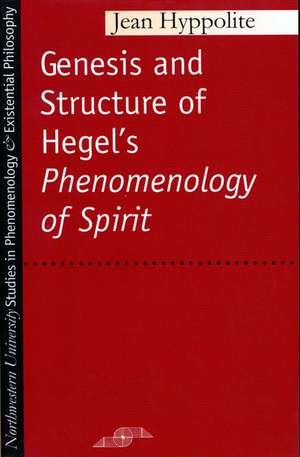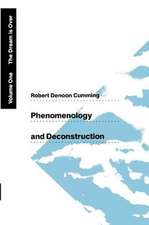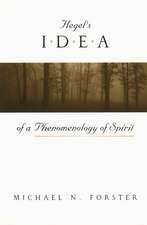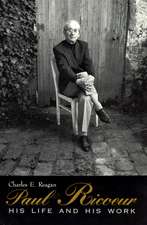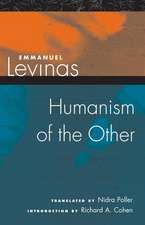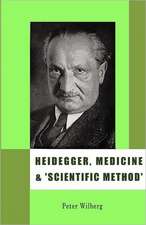Genesis and Structure of Hegel's "Phenomenology of Spirit": Studies in Phenomenology and Existential Philosophy
Autor Jean Hyppolite Traducere de Samuel Cherniak, John Heckmanen Limba Engleză Paperback – iun 1979
Jean Hyppolite produced the first French translation of Hegel's Phenomenology of Spirit. His major works—the translation, his commentary, and Logique et existence (1953)—coincided with an upsurge of interest in Hegel following World War II. Yet Hyppolite's influence was as much due to his role as a teacher as it was to his translation or commentary: Foucault and Deleuze were introduced to Hegel in Hyppolite's classes, and Derrida studied under him. More than fifty years after its original publication, Hyppolite's analysis of Hegel continues to offer fresh insights to the reader.
Din seria Studies in Phenomenology and Existential Philosophy
-
 Preț: 181.76 lei
Preț: 181.76 lei -
 Preț: 194.88 lei
Preț: 194.88 lei -
 Preț: 329.98 lei
Preț: 329.98 lei -
 Preț: 255.61 lei
Preț: 255.61 lei -
 Preț: 314.27 lei
Preț: 314.27 lei -
 Preț: 255.38 lei
Preț: 255.38 lei -
 Preț: 306.60 lei
Preț: 306.60 lei -
 Preț: 339.71 lei
Preț: 339.71 lei -
 Preț: 272.32 lei
Preț: 272.32 lei -
 Preț: 250.29 lei
Preț: 250.29 lei -
 Preț: 265.88 lei
Preț: 265.88 lei -
 Preț: 221.59 lei
Preț: 221.59 lei -
 Preț: 215.68 lei
Preț: 215.68 lei -
 Preț: 275.22 lei
Preț: 275.22 lei -
 Preț: 245.79 lei
Preț: 245.79 lei -
 Preț: 269.44 lei
Preț: 269.44 lei -
 Preț: 215.68 lei
Preț: 215.68 lei -
 Preț: 240.26 lei
Preț: 240.26 lei -
 Preț: 235.17 lei
Preț: 235.17 lei -
 Preț: 215.94 lei
Preț: 215.94 lei -
 Preț: 248.05 lei
Preț: 248.05 lei -
 Preț: 226.89 lei
Preț: 226.89 lei -
 Preț: 137.25 lei
Preț: 137.25 lei -
 Preț: 240.01 lei
Preț: 240.01 lei -
 Preț: 165.56 lei
Preț: 165.56 lei - 18%
 Preț: 698.04 lei
Preț: 698.04 lei -
 Preț: 195.68 lei
Preț: 195.68 lei -
 Preț: 267.53 lei
Preț: 267.53 lei -
 Preț: 223.63 lei
Preț: 223.63 lei -
 Preț: 220.74 lei
Preț: 220.74 lei -
 Preț: 314.03 lei
Preț: 314.03 lei - 21%
 Preț: 480.24 lei
Preț: 480.24 lei - 11%
 Preț: 274.46 lei
Preț: 274.46 lei - 11%
 Preț: 214.35 lei
Preț: 214.35 lei - 10%
 Preț: 232.06 lei
Preț: 232.06 lei - 11%
 Preț: 229.67 lei
Preț: 229.67 lei - 6%
 Preț: 331.75 lei
Preț: 331.75 lei - 36%
 Preț: 165.14 lei
Preț: 165.14 lei -
 Preț: 139.02 lei
Preț: 139.02 lei - 11%
 Preț: 228.57 lei
Preț: 228.57 lei - 12%
 Preț: 204.99 lei
Preț: 204.99 lei - 13%
 Preț: 252.48 lei
Preț: 252.48 lei - 13%
 Preț: 251.36 lei
Preț: 251.36 lei - 23%
 Preț: 588.68 lei
Preț: 588.68 lei
Preț: 242.69 lei
Nou
Puncte Express: 364
Preț estimativ în valută:
46.44€ • 48.49$ • 38.43£
46.44€ • 48.49$ • 38.43£
Carte tipărită la comandă
Livrare economică 04-18 aprilie
Preluare comenzi: 021 569.72.76
Specificații
ISBN-13: 9780810105942
ISBN-10: 0810105942
Pagini: 609
Dimensiuni: 152 x 229 x 42 mm
Greutate: 0.86 kg
Ediția:1
Editura: Northwestern University Press
Colecția Northwestern University Press
Seria Studies in Phenomenology and Existential Philosophy
ISBN-10: 0810105942
Pagini: 609
Dimensiuni: 152 x 229 x 42 mm
Greutate: 0.86 kg
Ediția:1
Editura: Northwestern University Press
Colecția Northwestern University Press
Seria Studies in Phenomenology and Existential Philosophy
Notă biografică
JEAN HYPPOLITE (1907–1968) was a French philosopher known for championing the work of Hegel, and other German philosophers, and educating some of France's most prominent post-war thinkers.
Cuprins
Translators' Preface
List of Hegel's Works
Introduction by John Heckman
Part I: Generalities on the Phenomenology
1. Meaning and Method of the Phenomenology
2. History and Phenomenology
3. The Structure of the Phenomenology
Part II: Consciousness, or the Phenomenological Genesis of the Concept
Introduction
1. Sensuous Certainty
2. Perception
3. Undersanding
Part III: The Transition from Natural Self-Consciousness to Universal Self-Consciousness
Introduction: The Movement of Consciousness to Self-Consciousness
1. Self-Consciousness and Life: The Independence of Self-Consciousness
2. The Liberty of Self-Consciousness: Stoicism and Skepticism
3. Unhappy Consciousness
Part IV: Reason in its Phenomenological Aspect
1. Reason and Idealism
2. The Observation of Nature
3. The Observation of Human Inidviduality
4. Active Reason and Modern Individualism
5. Human Works and the Dialectic of Action
Part V: Spirit: From Spiritual Substance to the Self-Knowledge of Spirit
Introduction
1. Immediate Spirit
2. The First Form of Spiritual Self
3. The World of Culture and Alienation
4. The Struggle between Enlightenment and Superstition
5. Absolute Freedom and the Terror: The Second Type of Spiritual Self
Part VI: From the Self-Knowledge of Spirit to Absolute Spirit
1. The Moral World View
2. Self-Certain Spirit: Self or Freedom (Third Type of Spiritual Self)
3. Religion: Mysticism or Humanism?
Part VII: Conclusion
Phenomenology and Logic: Absolute Knowledge
Glossary
List of Hegel's Works
Introduction by John Heckman
Part I: Generalities on the Phenomenology
1. Meaning and Method of the Phenomenology
2. History and Phenomenology
3. The Structure of the Phenomenology
Part II: Consciousness, or the Phenomenological Genesis of the Concept
Introduction
1. Sensuous Certainty
2. Perception
3. Undersanding
Part III: The Transition from Natural Self-Consciousness to Universal Self-Consciousness
Introduction: The Movement of Consciousness to Self-Consciousness
1. Self-Consciousness and Life: The Independence of Self-Consciousness
2. The Liberty of Self-Consciousness: Stoicism and Skepticism
3. Unhappy Consciousness
Part IV: Reason in its Phenomenological Aspect
1. Reason and Idealism
2. The Observation of Nature
3. The Observation of Human Inidviduality
4. Active Reason and Modern Individualism
5. Human Works and the Dialectic of Action
Part V: Spirit: From Spiritual Substance to the Self-Knowledge of Spirit
Introduction
1. Immediate Spirit
2. The First Form of Spiritual Self
3. The World of Culture and Alienation
4. The Struggle between Enlightenment and Superstition
5. Absolute Freedom and the Terror: The Second Type of Spiritual Self
Part VI: From the Self-Knowledge of Spirit to Absolute Spirit
1. The Moral World View
2. Self-Certain Spirit: Self or Freedom (Third Type of Spiritual Self)
3. Religion: Mysticism or Humanism?
Part VII: Conclusion
Phenomenology and Logic: Absolute Knowledge
Glossary
Recenzii
"Still the best commentary on the Phenomenology by the dean of French Hegelians." —Social Theory and Practice
Descriere
Jean Hyppolite produced the first French translation of Hegel's Phenomenology of Spirit. His major works—the translation, his commentary, and Logique et existence (1953)—coincided with an upsurge of interest in Hegel following World War II. Yet Hyppolite's influence was as much due to his role as a teacher as it was to his translation or commentary: Foucault and Deleuze were introduced to Hegel in Hyppolite's classes, and Derrida studied under him. More than fifty years after its original publication, Hyppolite's analysis of Hegel continues to offer fresh insights to the reader.
